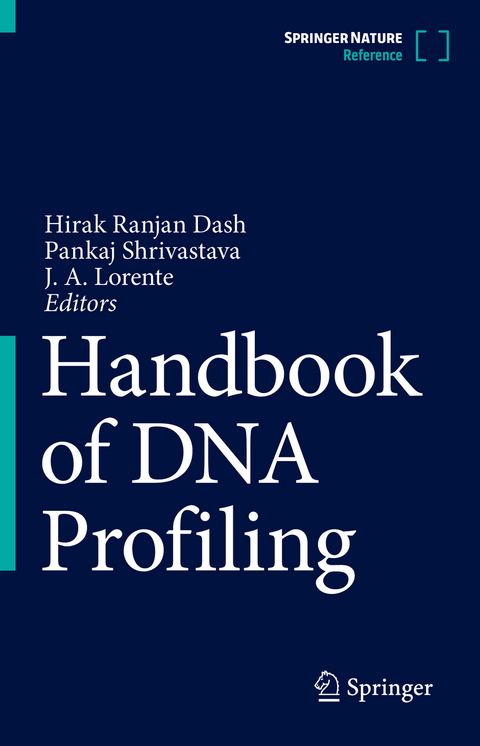
Handbook of DNA Profiling
Springer Verlag, Singapore
978-981-16-4317-0 (ISBN)
Dr. Hirak Ranjan Dash is currently working as an Assistant Professor of Forensic Biology and Biotechnology at the National Forensic Sciences University, Delhi Campus, India. Besides teaching and research, he is actively involved in conducting training programs to various beneficiaries of forensic science. Before joining academics, he served as a forensic DNA expert at Madhya Pradesh Forensic Science Laboratory, India, for over 6 years. He has an experience of conducting DNA examination in more than 1500 complicated cases. He has completed his Ph.D. from the Department of Life Science, National Institute of Technology, Rourkela, India, He received his M.Sc. in Microbiology from Orissa University of Agriculture and Technology, Odisha, India. His research interests include forensic microbiology, thanatomicrobiome analysis, molecular microbiology, DNA fingerprinting, and genetic manipulation. He is one of the pioneers in India to work on NGS technology-based forensic DNA analysis. He has written 8 books and published 50 research papers, 14 book chapters, 12 conference proceedings, and 4 popular science articles. Dr. Pankaj Shrivastava received his Ph.D. in microbiology with a specialization in biotechnology from the Department of Biological Science, Rani Durgawati University, Jabalpur, Madhya Pradesh, India. He is in charge of the Forensic DNA Fingerprinting facility of the Govt. of Madhya Pradesh, India at Sagar. Dr. Shrivastava has more than 13 years of experience as a bench worker for examining and reporting a wide range of criminal cases using DNA technology and deposing the court evidence. His research interests include population DNA database, improvement of xv methods in forensic DNA typing, finding rapid protocols for the technology, and microbial forensics. He is a two-time recipient of the prestigious Pt. Govind Vallabh Pant Award from the Bureau of Police Research and Development, Ministry of Home Affairs, Govt. of India, and a recipient of the Anusrajan Award from AIISECT University, Bhopal, for his authored books. Dr. Shrivastava is also a recipient of the FICCI Smart Policing award for developing a fast DNA-typing protocol. He is a visiting faculty at many universities, police training institutes, and judicial officers training institutes. Dr. Shrivastava has written 13 books and published 65 research papers in journals of repute in forensic science, 21 book chapters, 84 conference proceedings, and 15 popular science articles. J. A. Lorente is Professor of Forensic Medicine at the University of Granada, Spain. After graduating from the Faculty of Medicine of Granada in 1985, he completed his Ph.D. (Honors) in medicine and surgery at the University of Granada, in 1989. Dr. Lorente has published over 170 peer-reviewed papers and several books and book chapters. He has a special focus on the use of DNA and its application to human rights (he launched the first-ever database to identify missing people, the Spanish Phoenix Program, back in 1999); he also created and launched the DNA-PROKIDS Program in 2004, and the DNA-Pro-ORGAN Program in 2016. His areas of interest in forensics also deal with population variability and analysis of old and ancient DNA samples and databases expansion and control. Dr. Lorente is also actively working in medical genomics, and he is the scientific director of the Center for Genomics and Oncological Research (GENYO), where his team focuses on liquid biopsy and cancer interception. Dr. Lorente is the founder and first president of the AICEF (Ibero-Latin American Network of Forensic Sciences) and an honorary member of the AFSN (Asian Forensic Sciences Network).
Module 1._Principles of forensic DNA typing.- Module 2._Usefulness of various techniques of DNA typing in solving cases.- Module 3._Varied nature of cases solved by DNA typing.- Module 4._DNA analysis in disease diagnosis.- Module 5._Modifications in routine methodologies to solve challenging cases.- Module 6._Non-human Case studies.- Module 7._Quality control and Challenges in forensic DNA analysis.
| Erscheinungsdatum | 28.05.2022 |
|---|---|
| Reihe/Serie | Handbook of DNA Profiling |
| Zusatzinfo | 145 Illustrations, color; 28 Illustrations, black and white; XXIV, 1206 p. 173 illus., 145 illus. in color. In 2 volumes, not available separately. |
| Verlagsort | Singapore |
| Sprache | englisch |
| Maße | 155 x 235 mm |
| Themenwelt | Studium ► 2. Studienabschnitt (Klinik) ► Rechtsmedizin |
| Naturwissenschaften ► Biologie ► Genetik / Molekularbiologie | |
| Naturwissenschaften ► Biologie ► Mikrobiologie / Immunologie | |
| Recht / Steuern ► Strafrecht ► Kriminologie | |
| ISBN-10 | 981-16-4317-2 / 9811643172 |
| ISBN-13 | 978-981-16-4317-0 / 9789811643170 |
| Zustand | Neuware |
| Informationen gemäß Produktsicherheitsverordnung (GPSR) | |
| Haben Sie eine Frage zum Produkt? |
aus dem Bereich


